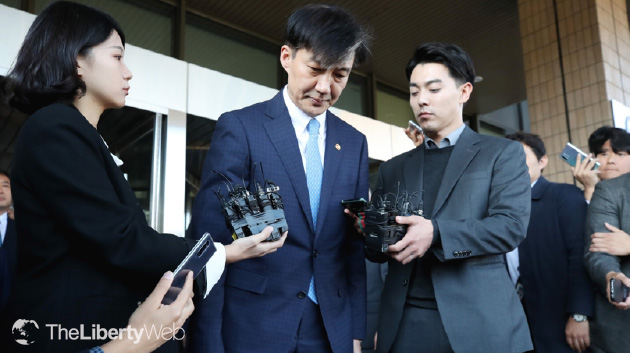Final Phase of Moon Jae-in Administration
Revise "Revenge Culture" and Modernize
Mr. Cho announced his resignation as Justice Minister, leaving behind the Ministry of Justice building in Seoul.
News
Cornered Moon Administration
A close confidant of President Moon Jae-in of South Korea, Justice Minister Cho Kuk, resigned in October after just one month since his appointment.
Huge crowds had been gathering to demand the resignation of Mr. Cho for a number of allegations, including his daughter’s fraudulent admission to University and suspicion of Mr. Cho’s family’s irregular financial investments.
Details
Possible Resignation Before Expiration of Term of Office
The Moon administration had already entered the “final phase” even before Mr. Cho’s resignation.
From chaebol dissolution policy to an increase in the minimum wage that hit businesses, the unemployment rate surged. As a way out, South Korea’s economic integration plan and hope for reunification with the North, aim to go up against Japan’s economy. South Korea is demonstrating a complete anti-Japanese sentiment: the break-off of the comfort women agreement, a radar lock-on by the South Korean army to the Self-Defense Force and a demand for wartime labor compensation.
When Japan tightened export controls on materials like semiconductors, South Korea withdrew from the General Security of Military Information Agreement (GSOMIA), an agreement to share military information with Japan. South Korea is moving closer to China and North Korea, yet their actions aren’t being reciprocated by the North.
President Moon’s approval rate two and a half years ago at the beginning of the Moon administration was over 80%; since then, it has dropped to its lowest at 39% (as of Oct. 18).
South Korea’s legislative election that takes place every four years will be held next April; the Moon administration will be put to test as a turning point until President Moon’s term of office ends in 2022. If things continue, President Moon may be forced to resign before completing his term.
Background
Prosecution and Secret Feud of Moon Administration
On the other hand, South Korea is said to be a “republic of prosecutors,” and prosecutors monopolize the right of investigation and prosecution. Prosecution has enough power, that a compulsory investigation can easily remove a president from office.
President Moon planned to have Mr. Cho reform the prosecution, including creating an independent body to probe corruption allegations of senior government officials and transferring more investigative power to the police from prosecution. However, there is speculation that this was a strategic move to protect President Moon from being arrested or imprisoned by the next administration after ending his term.
South Korea has a “custom” of jailing ex-presidents and their families for various charges of corruption after administration changes. However, there are false accusations as well.
For example, former President Park Geun-hye was removed from office for accusations including abusing his power to get the daughter of his friend, Choi Soon-sil, into university. However, it was discovered that the tablet computer that was used as material evidence against Park was not Choi’s. False data were created.
There have been many unfortunate cases of South Korea’s past presidents who committed suicide or were sentenced to death. President Moon or Mr. Cho have high possibilities of going down similar paths.
South Korea’s regime is similar to that of Japan’s Sengoku era — those with power destroy opposing forces by robbing their lives and properties. This “revenge culture” cannot be the traits of a modern nation.
Steps to Take Next
Democracy Requires Religion
South Korea is not a pure “rule of law,” but a “rule of law” governed by emotions. Politicians, prosecutors, the court and the press take the place of God, abusing their power and manipulating citizens to crush political opponents.
“When I try calling for South Korea’s god, no one steps forward…The country is suffering because they currently don’t have a god,” Happy Science CEO Master Ryuho Okawa said in August (*).
South Korea requires proper ideology and religion in order to modernize and become a true democratic country. Their war ended 70 years ago. Now is the time for South Korea to discover what defines God’s justice and reflect on their country’s history.



















